- Home
- E. E. Smith
Triplanetary Page 10
Triplanetary Read online
Page 10
CHAPTER X
The _Boise_ Acts
But what of the super-ship? What happened after that inertialess, thatterribly destructive take-off?
Doctor Frederick Rodebush sat at the control panel of Triplanetary'snewly reconstructed space-ship, his hands grasping the gleaming, ebonitehandles of two double-throw switches. Facing the unknown though thephysicist was, yet he grinned whimsically at his friend.
"Something, whatever it is, is about to take place. The _Boise_ istaking off, under full neutralization. Ready for anything to happen,Cleve?"
"All ready--shoot!" Laconically. Cleveland also was constitutionallyunable to voice his deeper sentiments in time of stress.
Rodebush flipped the switches clear over in flashing arcs, and instantlyover both men there came a sensation akin to a tremendously intensifiedvertigo; but a vertigo as far beyond the space-sickness ofweightlessness, as that horrible sensation is beyond mere terrestrialdizziness. The pilot tried to reverse the switches he had just thrown,but his leaden hands utterly refused to obey the dictates of his reelingmind. His brain was a writhing, convulsive mass of tormentindescribable; expanding, exploding, swelling out with an unendurablepressure against its confining skull. Fiery spirals, laced withstreaming, darting lances of black and green, flamed inside his burstingeyeballs. The Universe spun and whirled in mad gyrations about him as hereeled drunkenly to his feet, staggering and sprawling. He fell. Herealized that he was falling, yet he could not fall! Thrashing wildly,grotesquely in agony, he struggled madly and blindly across the room,directly toward the thick steel wall. The tip of one hair of his unrulythatch touched the wall, and the slim length of that single hair did noteven bend as its slight strength brought to an instant halt thehundred-and-eighty-odd pounds of mass--mass now entirely withoutinertia--that was his body.
But finally the sheer brain power of the man began to triumph over hisphysical torture. By indomitable force of will he compelled his gropinghands to seize a life-line, almost meaningless to his dazedintelligence; and through that nightmare incarnate of hellish torture hefought his way back to the control board. Hooking one leg around astandard, he made a seemingly enormous effort and drove the two switchesback into their original positions; then fell flat upon the floor,weakly but in a wave of relief and thankfulness, as his racked body feltagain the wonted phenomena of weight and of inertia. White, trembling,frankly and openly sick, the two men stared at each other in half-amazedjoy.
"It worked." Cleveland smiled wanly as he recovered sufficiently tospeak, then leaped to his feet. "Snap it up, Fred! We must be fallingfast--we'll be wrecked when we hit!"
"We're not falling anywhere." Rodebush, foreboding in his eyes, walkedover to the main observation plate and scanned the heavens. "However,it's not as bad as I was afraid it might be. I can still recognize a fewof the constellations, even though they are all pretty badly distorted.That means that we can't be more than a couple of light-years or so awayfrom the Solar System. Of course, since we had so little thrust on,practically all of our time and energy was spent in getting out of theatmosphere; but, even at that, it's a good thing that space isn't anabsolutely perfect vacuum or we would have been clear out of theUniverse by this time."
"Huh? Impossible--where are we anyway? Then we must be making mil ...Oh, I see!" Cleveland exclaimed in disjointed sentences as he alsostared into the plate.
"Right. We aren't traveling at all _now_." Rodebush replied. "We areperfectly stationary relative to Tellus, since we made the hop withoutinertia. We must have attained one hundred percent neutralization, whichwe didn't quite expect, and therefore we must have stoppedinstantaneously when our inertia was restored. But it isn't _where_ weare that is worrying me the most--we can fix our place in spaceaccurately enough by a few observations--it's _when_."
"That's right, too. Say we're two light-years away. You think maybewe're two years older than we were ten minutes ago, then? That'spossible, of course, maybe probable: there's been a lot of discussion onthat theory. Now's a good time to prove or to disprove it. Let's snapback to Tellus and find out."
"We'll do that, after a little more experimenting. You see, I had nointention of giving us such a long push. I was going to throw theswitches over and back, but you know what happened. However, there's onegood thing about it--it's worth two years of anybody's life to settlethat relativity-time thing definitely, one way or the other."
"I'll say it is. But say, we've got a lot of power on our ultra-wave:enough to reach Tellus, I think. Let's locate the sun and get in touchwith Samms."
"Let's work on these controls a little first, so we'll have something toreport. Out here's a fine place to try the ship out--nothing in theway."
"All right with me. But I _would_ like to find out whether I'm two yearsolder than I think I am, or not!"
Then for hours they put the great super-ship through her paces, just astest-pilots check up on every detail of performance of an airplane ofnew and radical design. They found that the horrible vertigo could beendured, perhaps in time even conquered as space-sickness could beconquered, by a strong will in a sound body; and that their newconveyance had possibilities of which even Rodebush had never dreamed.Finally, their most pressing questions answered, they turned their mostpowerful ultra-beam communicator toward the yellowish star which theyknew to be Old Sol.
"Samms ... Samms." Cleveland spoke slowly and distinctly. "Rodebush andCleveland reporting from the 'Space-Eating Wampus', now directly in linewith Beta Ursae Minoris from the sun, distance about two point two lightyears. It will take six banks of tubes on your tightest beam, LSV3, toreach us. Barring a touch of an unusually severe type of space-sickness,everything worked beautifully; even better than our calculations showed.There's something we want to know right away--have we been gone fourhours and some odd minutes, or better than two years?"
He shut off the power, turned to Rodebush, and went on:
"Nobody knows how fast this ultra-wave travels, but if it goes as fastas we did coming out it's certainly moving. I'll give him about thirtyminutes, then shoot in another call."
But in less than two minutes the care-ravaged face of their chiefappeared sharp and clear upon their plates and his voice snapped curtlyfrom the speaker.
"Thank God you're alive, and twice that the ship works!" he exclaimed."You've been gone four hours, eleven minutes, and forty-one seconds, butnever mind about abstract theorizing. Get back here, to Pittsburgh, asfast as you can drive. That Nevian vessel or another like her is moppingup the city, and has destroyed half the Fleet already!"
"We'll be back there in nine minutes!" Rodebush snapped into thetransmitter. "Two to get from here to atmosphere, four from atmospheredown to the Hill, and three to cool off. Notify the full four-shiftcrew--everybody we've picked out. Don't need anybody else. Ship,batteries, and armament are _ready_!"
"Two minutes to atmosphere, and it took ten coming out? Think you can doit?" Cleveland asked, as Rodebush flipped off the power and leaped tothe control panel.
"We could do it in a few seconds if we had to. We used scarcely anypower at all coming out, and I'm not using very much going back," thephysicist explained rapidly, as he set the dials which would determinetheir flashing course.
The master switches were thrown and the pangs of inertialessness againassailed them--but weaker far this time than ever before--and upon theirlookout plates they beheld a spectacle never before seen by eye of man.For the ultra-beam, with its heterodyned vision, is not distorted by anyvelocity yet attained, as are the ether-borne rays of light. Convertedinto light only at the plate, it showed their progress as truly asthough they had been traveling at a pace to be expressed in the ordinaryterms of miles per hour. The yellow star that was the sun detacheditself from the firmament and leaped toward them, swelling visibly,momentarily, into a blinding monster of incandescence. And toward themalso flung the earth, enlarging with such indescribable rapidity thatCleveland protested involuntarily, in spite of his knowledge of thepeculiar mechanism of the vessel
in which they were.
"Hold it, Fred, hold it! Way 'nuff!" he exclaimed.
"I'm using only ten thousand dynes, so she'll stop herself as soon as wetouch atmosphere, long before she can even begin to heat," Rodebushexplained. "Looks bad, but we'll stop without a jar."
And they did. Weightless and without inertia, gravitation powerlessagainst her neutralizing generators, the great super-ship came from herpractically infinite velocity to an almost instantaneous halt in theoutermost, most tenuous layer of the earth's atmosphere. Her halt wasbut momentary. Inertia restored and gravitation allowed again to affecther mass, she dropped at a sharp angle downward. More than dropped; shewas forced downward by one full battery of projectors; projectors drivenby iron-powered generators. Soon they were over the Hill, whose violetscreens went down at a word.
Flaming a dazzling white from the friction of the atmosphere throughwhich she had torn her way, the _Boise_ slowed abruptly as she nearedthe ground, plunging toward the surface of the small but deep artificiallake below the Hill's steel apron. Into the cold waters the space-shipdove, and even before they could close over her, furious geysers ofsteam and boiling water erupted as the stubborn alloy gave up its heatto the cooling liquid. Endlessly the three necessary minutes draggedtheir slow way into time, but finally the water ceased boiling andRodebush tore the ship from the lake and hurled her into the gapingdoorway of her dock. The massive doors of the air-locks opened, andwhile the full crew of picked men hurried aboard with their personalequipment, Samms talked earnestly to the two scientists in the controlroom.
" ... and about half the fleet is still in the air. They aren'tattacking; they are just trying to keep her from doing much more damageuntil you can get there. How about your take-off? We can't launch youagain--the tracks are gone--but you handled her easily enough comingin?"
"That was all my fault," Rodebush admitted. "I should have neutralizedinertia first, but I had no idea that the fields would extend beyond thehull, nor that they wouldn't act simultaneously. We'll take her out onthe projectors this time, though, the same as we brought her in--shehandles like a bicycle. The projector blast tears things up a little,but nothing serious. Have you got that Pittsburgh beam for me yet? We'reabout ready to go."
"Here it is, Doctor Rodebush," came the secretary's voice, and upon thescreen there flashed into being the view of the events transpiring abovethat doomed city. "The dock is empty and sealed against your blast," andthereupon "Good-bye, and power to your tubes!" came Samms' ringingvoice.
As the words were being spoken, mighty blasts of power raved from thedriving projectors and the immense mass of the super-ship shot outthrough the portals and upward into the stratosphere. Through thetenuous atmosphere the huge ship rushed with ever-mounting speed, andwhile the hope of Triplanetary drove eastward Rodebush studied theever-changing scene of battle upon his plate and issued detailedinstructions to the highly trained specialists manning every offensiveand defensive weapon.
But the Nevians did not wait to join battle until the newcomers arrived.Their detectors were sensitive--operative over untold thousands ofmiles--and the ultra-screen of the Hill had already been noted by theinvaders as the earth's only possible source of trouble. Thus thedeparture of the _Boise_ had not gone unnoticed, and the fact, that, noteven with his most penetrant rays could he see into her interior, hadalready given the Nevian commander some slight concern. Therefore, assoon as it was determined that the great ship was being directed towardPittsburgh the fish-shaped cruiser of the void went into action.
High in the stratosphere, speeding eastward, the immense mass of the_Boise_ slowed abruptly, although no projector had slackened its effort.Cleveland, eyes upon interferometer grating and spectrophotometercharts, fingers flying over calculator keys, grinned as he turned towardRodebush.
"Just as you thought, Skipper; an ultra-band pusher. C4V63L29. Shall Igive him a little pull?"
"Not yet; let's feel him out a little before we force a close-up. We'vegot plenty of mass. See what he does when I put full push on theprojectors."
As the full power of the Terrestrial vessel was applied the Nevian wasforced backward, away from the threatened city, against the full driveof her every projector. Soon, however, the advance was again checked,and both scientists read the reason upon their plates. The enemy had putdown re-enforcing rods of tremendous power. Three compression membersspread out fanwise behind her, bracing her against the low mountainside,while one huge tractor beam was thrust directly downward, holding in anunbreakable grip a cylinder of earth extending deep down into bedrock.
"Two can play at that game!" And Rodebush drove down similar beams, andforward-reaching tractors as well. "Strap yourselves in solid,everybody!" he sounded a general warning. "Something is going to giveway somewhere soon, and when it does we'll get a jolt!"
And the promised jolt did indeed come soon. Prodigiously massive andpowerful as the Nevian was, the _Boise_ was even more massive and morepowerful; and as the already enormous energy feeding the tractors,pushers, and projectors was raised to its inconceivable maximum, thevessel of the enemy was hurled upward, backward; and that of earth shotahead with a bounding leap that threatened to strain even her mightymembers. The Nevian anchor-rods had not broken; they had simply pulledup the vast cylinders of solid rock that had formed their anchorages.
"Grab him now!" Rodebush yelled, and even while an avalanche of fallingrock was burying the countryside, Cleveland snapped a tractor ray uponthe flying fish and pulled tentatively.
Nor did the Nevian now seem averse to coming to grips. The two warringsuper-dreadnaughts darted toward each other, and from the invader thereflooded out the dread crimson opacity which had theretofore meant thedoom of all things Solarian. It flooded out and engulfed the immensemass of humanity's hope in its spreading cloud of redly impenetrablemurk. But not for long. Triplanetary's super-ship boasted no ordinaryTerrestrial defense, but was sheathed in screen after screen ofultra-vibrations: imponderable walls, it is true, but barriersimpenetrable to any unfriendly wave. To the outer screen the red veil ofthe Nevians clung tenaciously, licking greedily at every square inch ofthe shielding sphere of force, but unable to find an opening throughwhich to feed upon the steel of the _Boise_'s armor.
"Get back--'way back! Go back and help Pittsburgh!" Rodebush drove anultra-communicator beam through the murk to the instruments of theTerrestrial admiral; for the surviving warships of the Fleet--its mostpowerful units--were hurling themselves forward, to plunge into that reddestruction. "None of you will last a second in this red field. Andwatch out for a violet field pretty soon--it'll be worse than this. Wecan handle them alone, I think; but if we can't, there's nothing in theSystem that can help us!"
And now the hitherto passive screen of the super-ship became active. Atfirst invisible, it began to glow in livid, violet light, and as theglow brightened to unbearable intensity the entire spherical shieldbegan to increase in size. Driven outward from the super-ship as acenter, its advancing surface of seething energy consumed the crimsonmurk as a billow of blast-furnace heat consumes a cloud of snowflakes inthe air above its shaft. Nor was the red death-mist all that wasconsumed. Between that ravening surface and the armor skin of the_Boise_ there was nothing. No debris, no atmosphere, no vapor, no singleatom of material substance--the first time in Terrestrial experiencethat an absolute vacuum had ever been attained!
Stubbornly contesting every foot of way lost, the Nevian fog retreatedbefore the violet sphere of nothingness. Back and back it fell,disappearing altogether from all space as the violet tide engulfed theenemy vessel; but the flying fish did not disappear. Her triple screensflashed into furiously incandescent splendor and she entered, unscathed,that vacuous sphere, which collapsed instantly into an enormouslyelongated ellipsoid, at each focus a madly warring ship of space.
Then in that tube of vacuum was waged a spectacular duel ofultra-weapons--weapons impotent in air, but deadly in empty space.Beams, rays, and rods of Titanic power smote cracklingly againstultra-screen
s equally capable. Time after time each contestant ran thegamut of the spectrum with his every available ultra-force, only to findall channels closed. For minutes the terrible struggle went on, then:
"Cooper, Adlington, Spencer, Dutton!" Rodebush called into histransmitter. "Ready? Can't touch him on the ultra, so I'm going onto themacro-bands. Give him everything you have as soon as I collapse theviolet. Go!"
At the word the violet barrier went down, and with a crash as of adisrupting Universe the atmosphere rushed into the void. And through thehurricane there shot out the deadliest material weapons of Triplanetary.Torpedoes--non-ferrous, ultra-screened, beam-dirigible torpedoes chargedwith the most effective forms of material destruction known to man.Cooper hurled his canisters of penetrating gas, Adlington his atomiciron explosive bombs, Spencer his indestructible armor-piercingprojectiles, and Dutton his shatterable flasks of the quintessence ofcorrosion--a sticky, tacky liquid of such dire potency that only onerare Solarian element could contain it. Ten, twenty, fifty, a hundredwere thrown as fast as automatic machinery could launch them; and theNevians found themselves adversaries not to be despised. Size for size,their screens were quite as capable as those of the _Boise_. TheNevians' destructive rays glanced harmlessly from their shields, and theNevians' elaborate screens, neutralized at impact by those of thetorpedoes, were impotent to impede their progress. Each projectile mustneeds be caught and crushed individually by beams of the most prodigiouspower; and while one was being annihilated dozens more were rushing tothe attack. Then, while the twisting, dodging invader was busiest withthe tiny but relentless destroyers, Rodebush launched his heaviestweapon.
The macro-beams! Prodigious streamers of bluish-green flame which toresavagely through course after course of Nevian screen! Malevolent fangs,driven with such power and velocity that they were biting into the verywalls of the enemy vessel before the amphibians knew their defensiveshells of force had been punctured! And the emergency screens of theinvaders were equally futile. Course after course was sent out, only toflare viciously through the spectrum and to go black!
Outfought at every turn, the now frantically dodging Nevian leaped awayin headlong flight, only to be brought to a staggering, crashing halt asCleveland nailed her with a tractor beam. But the Terrestrials were tolearn that the Nevians held in reserve a means of retreat. The tractorsnapped--sheared off squarely by a sizzling plane of force--and thefish-shaped cruiser faded from Cleveland's sight, just as the _Boise_had disappeared from the communicator plates of Radio Center, back inthe Hill, when she was launched. But though the plates in the controlroom could not hold the Nevian, she did not vanish beyond the ken ofRandolph, now Communications Officer in the super-ship. For, warned andhumiliated by his losing one speeding vessel from his plates in RadioCenter, he was now ready for any emergency. Therefore as the Nevianfled, Randolph's spy-ray held her, automatically behind it as there wasthe full output of twelve special banks of iron-driven power tubes; andthus it was that the vengeful Terrestrials flashed immediately along theNevians' line of flight. Inertialess now, pausing briefly from time totime to enable the crew to accustom themselves to the new sensations,the _Boise_ pursued the invader; hurtling through the void with avelocity unthinkable.
"He was easier to take than I thought he would be," Cleveland grunted,staring into the plate.
"I thought he had more stuff, too," Rodebush assented; "but I guessCostigan got almost everything they had. If so, with all our own stuffand most of theirs besides, we should be able to take them. They musthave neutralization, too, to take off like that; and if it's one hundredper cent we'll never catch them ... but it isn't--there they are!"
"And this time I'm going to hold her or burn out all our generatorstrying," Cleveland declared, grimly. "Are you fellows down there able tohandle yourselves yet? Fine! Start throwing out your cans!"
Space-hardened veterans all, the other Terrestrial officers had foughtoff the horrible nausea of inertialessness, just as Rodebush andCleveland had done. Again the ravening green macro-beams tore at theflying cruiser, again the mighty frames of the two space-ships shudderedsickeningly as Cleveland clamped on his tractor rod, again the highlydirigible torpedoes dashed out with their freights of death anddestruction. And again the Nevian shear-plane of force slashed at theTerrestrial's tractor beam; but this time the mighty puller did not giveway. Sparkling and spitting high-tension sparks, the plane bit deeplyinto the stubborn rod of energy. Brighter, thicker, and longer grew thedischarges as the gnawing plane drew more and more power; but in directratio to that power the rod grew larger, denser, and ever harder to cut.More and more vivid became the pyrotechnic display of electricbrilliance, until suddenly the entire tractor rod disappeared. At thesame instant a blast of intolerable flame erupted from the _Boise_'sflank and the whole enormous fabric of her shook and quivered under theforce of a terrific detonation.
"Randolph! I don't see them! Are they attacking or running?" Rodebushdemanded. He was the first to realize what had happened.
"Running--fast!"
"Just as well, perhaps, but get their line. Adlington!"
"Here!"
"Good! Was afraid you were gone--that was one of your bombs, wasn't it?"
"Yes. Well launched, just inside the screens. Don't see how it couldhave detonated unless something hot and hard struck it in the tube; itwould need about that much time to explode. Good thing it didn't go offany sooner, or none of us would have been here. As it is, Area Six ispretty well done in, but the bulkheads held the damage to Six. Whathappened?"
"We don't know, exactly. Both generators on the tractor beam went out.At first, I thought that was all, but my neutralizers are dead and Idon't know what else. When the G-4's went out the fusion must haveshorted the neutralizers. They would make a mess; it must have burned ahole down into number six tube. Cleveland and I will come down, andwe'll all look around."
Donning space-suits, the scientists let themselves into the damagedcompartment through the emergency air-locks, and what a sight they saw!Both outer and inner walls of alloy armor had been blown away by theawful force of the explosion. Jagged plates hung awry; bent, twisted,and broken. The great torpedo tube, with all its intricate automaticmachinery, had been driven violently backward and lay piled in hideousconfusion against the backing bulkheads. Practically nothing remainedwhole in the entire compartment.
"Nothing much we can do here," Rodebush said finally, through histransmitter, "Let's go see what number four generator room looks like."
That room, although not affected by the explosion from without, had beenquite as effectively wrecked from within. It was still stiflingly hot;its air was still reeking with the stench of burning lubricant,insulation, and metal; its floor was half covered by a semi-molten massof what had once been vital machinery. For with the burning out of thegenerator bars the energy of the disintegrating allotropic iron had hadno outlet, and had built up until it had broken through its insulationand in an irresistible flood of power had torn through all obstacles inits path of neutralization.
"Hm-m-m. Should have had an automatic shut-off--one detail weoverlooked," Rodebush mused. "The electricians _can_ rebuild this stuffhere, though--that hole in the hull is something else again."
"I'll say it's something else," the grizzled Chief Engineer agreed."She's lost all her spherical strength--anchoring a tractor with thisship now would turn her inside out. Back to the nearest Triplanetaryshop for us, I would say."
"Come again, Chief!" Cleveland advised the engineer. "None of us wouldlive long enough to get there. We can't travel inertialess until therepairs are made, so if they can't be made without very much traveling,it's just too bad."
"I don't see how we could support our jacks...." The engineer paused,then went on. "If you can't give me Mars or Tellus, how about some otherplanet? I don't care about atmosphere, or about anything but mass. I canstiffen her up in three or four days if I can sit down on somethingheavy enough to hold our jacks and presses; but if we have to rig upspace-cradles around the s
hip herself it'll take a long time--months,probably. Haven't got a spare planet on hand, have you?"
"We might have, at that," Rodebush made surprising answer. "A couple ofseconds before we engaged we were heading toward a sun with at least twoplanets. I was just getting ready to dodge them when we cut theneutralizers, so they should be fairly close somewhere--yes, there's thesun, right over there. Rather pale and small; but it's close,comparatively speaking. We'll go back up into the control room and findout about the planets."
The strange sun was found to have three large and easily locatedchildren, and observation showed that the crippled space-ship couldreach the nearest of these in about five days. Power was therefore fedto the driving projectors, and each scientist, electrician, and mechanicbent to the task of repairing the ruined generators; rebuilding them tohandle any load which the converters could possibly put upon them. Fortwo days the _Boise_ drove on; then her acceleration was reversed, andfinally a landing was effected upon the forbidding, rocky soil of thestrange world.
It was larger than the earth, and of a somewhat stronger gravitation.Although its climate was bitterly cold, even in its short daytime, itsupported a luxuriant but outlandish vegetation. Its atmosphere, whilerich enough in oxygen and not really poisonous, was so rank withindescribably fetid vapors as to be scarcely breathable.
But these things bothered the engineers not at all. Paying no attentionto temperature or to scenery and without waiting for chemical analysisof the air, the space-suited mechanics leaped to their tasks; and inonly a little more time than had been mentioned by the chief engineerthe hull and giant frame of the super-ship were as staunch as of yore.
"All right, Skipper!" came finally the welcome word. "You might try herout with a fast hop around this world before you shove off in earnest."
Under the fierce blast of her projectors the vessel leaped ahead, andtime after time, as Rodebush hurled her mass upon tractor beam orpressor, the engineers sought in vain for any sign of weakness. Thestrange planet half girdled and the severest tests passed flawlessly,Rodebush reached for his neutralizer switches. Reached and paused,dumfounded, for a brilliant purple light had sprung into being upon hispanel and a bell rang out insistently.
"What the blue blazes!" Rodebush shot out an exploring beam along thedetector line and gasped. He stared, mouth open, then yelled:
"_Roger_ is here, rebuilding his planetoid! _STATIONS ALL_!"

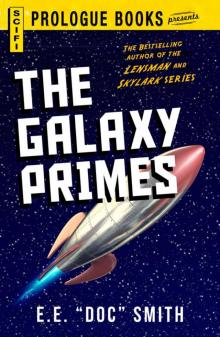 The Galaxy Primes
The Galaxy Primes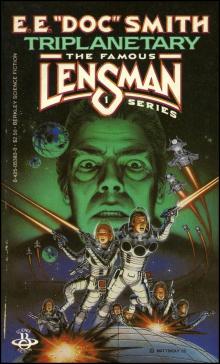 Triplanetary
Triplanetary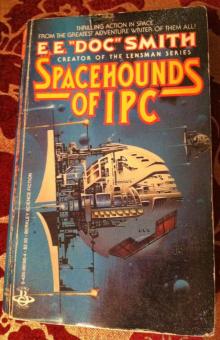 Spacehounds of IPC
Spacehounds of IPC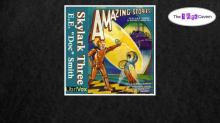 Skylark Three
Skylark Three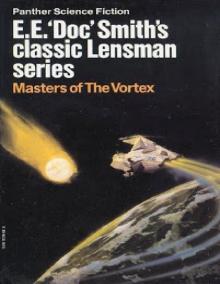 The Vortex Blaster
The Vortex Blaster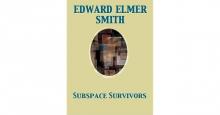 Subspace Survivors
Subspace Survivors